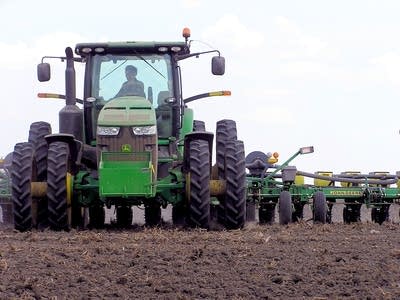Farm bill support frays amid tight money, shifting alliances
Go Deeper.
Create an account or log in to save stories.
Like this?
Thanks for liking this story! We have added it to a list of your favorite stories.

For decades, Congress rolled food stamps and farm subsidies together into one giant bill. The tactic generated lots of rural and urban votes from politicians in both parties. Everyone got something out of the deal.
That longtime marriage, though, is in trouble. With federal money tight, old alliances are starting to fray.
The House last month unexpectedly rejected a bipartisan farm bill. As Congress returns from the July Fourth holiday, Republican lawmakers are talking about splitting agriculture and food stamps into separate legislation. That could lead to both sides getting less than they want.
In a sign that the farm lobby recognizes the trouble it's in, major farm groups wrote to House Speaker John Boehner last week asking him to keep the farm bill together in its present form and not hold a separate vote on food stamps. During the debate on the failed farm bill, the House approved amendments limiting payouts to farmers and came close to cutting back generous crop insurance subsidies.
Turn Up Your Support
MPR News helps you turn down the noise and build shared understanding. Turn up your support for this public resource and keep trusted journalism accessible to all.
"The old alliance of nutrition and ag, it just doesn't have the power it used to," said Josh Sewell, a policy analyst with the nonpartisan group Taxpayers for Common Sense, which opposed the farm bill.

"In the past, all those groups used to be able to get together and there was enough money to shovel around to each group so they could get what they wanted," he said. "Now we're at a point where they want different things and we're in a tight budgetary environment so we can't frankly just buy each commodity off."
Former U.S. Agriculture Secretary Dan Glickman and other observers say each of the commodity groups has been too busy trying to get their own best deal to see the big picture.
"The agriculture groups need to be working as a team rather than dairy working dairy, sugar working sugar and corn working corn," Glickman said.
Congressional leaders brought food stamps and agricultural subsidies together in the early 1970s. Rural lawmakers realized their numbers were shrinking and they needed the support of their colleagues in the cities, many of whom had poor constituents who were struggling to get by.
Agriculture interests have held enormous sway over Congress and essentially wrote major parts of each five-year farm bill. They spent an estimated $150 million in 2012 on lobbying and political contributions, according to the Center for Responsive Politics.
The failure to deliver a farm bill this year and last year represents a significant change in how Congress operates, says John Hopkins University political scientist Adam Sheingate, who studies agricultural politics.
"A friend of mine said to me, tongue in cheek, 'what a world we live in where Congress can't even pass pork barrel laws anymore,'" Sheingate said. "That sort of shows you how far we've come."
Relatively flush times in the farm belt might be part of the problem.
Despite some regional differences -- Midwest corn farmers are happy with federally subsidized crop insurance while southern cotton and peanut farmers want a guarantee the government will step in if prices fall too much -- farmers are doing pretty well these days, and this deadlocked Congress is mostly only able to respond to crises, said Ferd Hoefner, policy director of the nonprofit National Sustainable Agriculture Coalition.
"If prices were low right now, I think there would be so much more agitation that members of Congress would be hearing about it and it would be more likely to pass," he added.
Hoefner has been involved with every farm bill since 1977. Every time, he says Congress has eventually passed a bill. But Hoefner says this time really could be different.
"You would think that commodity producers would say, 'Oh my goodness, no, we have to stay linked with food stamps,'" Hoefner said. "I wish I was more optimistic than I am that there's a chance for this farm bill."



